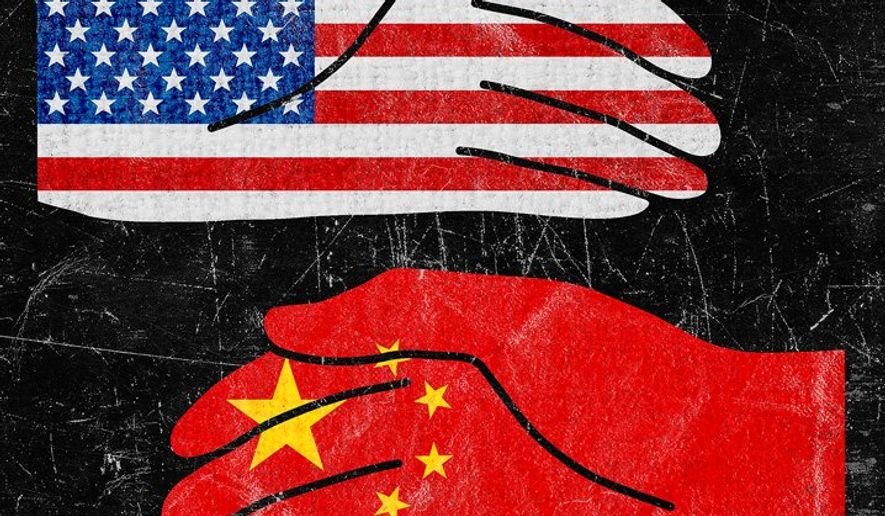OPINION:
Many in the United States and China believe that we’re in a cold war and that conflict is inevitable. If true, that would be tragic not only for the United States and China, but for the world. More must be done now to ensure that this does not happen; that U.S.-China bilateral relations cease its current downward spiral and move in a more positive direction.
The Nixon 1972 visit to China was a bold and brilliant move. The visit was welcomed by Mao Zedong who, since 1965, was hoping to improve relations with the United States, in part to mitigate the existential threat from an aggressive Soviet Union.
Relations with China improved quickly, with liaison offices in 1973 and the establishment of diplomatic relations in 1979. The United States was there for China and its new leader, Deng Xiaoping, who took over in December 1978. Deng inherited a China in political and economic disarray. His immediate goal was to quickly address China’s failed economic system, and he looked to the United States for help, with capital investments and joint ventures. Thousands of Chinese students were encouraged to study in the United States, hoping that even a small percentage of these students would return to China to provide the intellectual know-how to help cure China’s ailing economy. Indeed, it was the United States that was there for China and Deng, providing economic and political support. This support continued for the next two decades, culminating in 2001 with China’s entry into the World Trade Organization (WTO).
This period of good bilateral relations included cooperation on a number of international security issues. Working with China, we defeated the Soviet Union in Afghanistan, the beginning of the unraveling of the Soviet Empire. There was cooperation with China on efforts to counter nuclear proliferation, terrorism, narcotics and piracy on the sea. These efforts helped to provide for the common good; helped to defeat the enemies of the people.
The irony now is that people in the United States and China believe we’re in a cold war. A constant refrain from many in China is that the United States is trying to contain China, fearing that China eventually will overtake the United States. Conversely, many in the United States believe that China wants to be a regional and global hegemon, replacing the United States as a world leader.
Trade talks with China continue, with efforts to address the significant trade deficit of $378 billion we have with China. But the overall amount of trade — $737 billion — we conduct with China clearly tells us that our respective economies are interdependent. No doubt our trade deficit has to be addressed, in addition to: IP theft, currency manipulation, market access and unfair trading practices, with U.S. companies competing against State Owned Enterprises (SOE) supported by the state.
China is on a fast track with its focus on artificial intelligence (AI), hypersonics, nuclear weapons, robotics and space. We just saw their indigenously built aircraft carrier sail through the Taiwan Strait, a message to Taiwan and the United States that China, with an established submarine fleet, will have a blue water navy with significant reach.
Given China’s occupation and militarization of islands in the South China Sea, its ongoing tension with Taiwan and the human rights excesses in Xinjiang Province, with its treatment of the Uighurs, bilateral relations are worsening. Its global ambitions and overseas basing are other issues of immediate concern.
The irony should be clear to all of us. China reached out to the United States in 1972 because it feared a war with the Soviet Union, to include the possible use of nuclear weapons. Diplomatic relations with the United States were established and working with the United States, and others, China was instrumental in defeating the Soviets in Afghanistan, a prelude to the end of the Soviet Empire. Now in 2019, we’re witnessing rapprochement between China and Russia, to include joint military exercises.
Something has to be done to change this negative trajectory, assuming change is possible. Currently, the United States and China conduct a number of ministerial and lower level meetings and exchanges dealing with security and trade. To date, it appears that these sessions haven’t been effective. It appears that these meetings are limited by protocol and Chinese suspicion, and by such a divergence of views that there’s little real genuine dialogue and an absence of trust.
Something has to be done, now. Establishing routine sub-ministerial meetings, between professionals from State Department, Defense Department, Treasury, Justice and the intelligence community, is advisable. Both countries should send their best officers to these meetings to, at a minimum, build ties and establish trust. At these working level meetings, the issues for which we have divergent views should be discussed, with the goal of a path to resolution. Equally important, however, will be a dialogue on a multitude of security issues for which China and the United States should cooperate, like proliferation, international organized crime, pandemics etc. We cooperated in the ’80s and ’90s, with good results; it’s possible we can cooperate again, for the betterment of both countries and mankind.
A new and comprehensive strategy to address issues with China should be one of the highest priorities for the leadership in Washington and Beijing. If we don’t act now, our countries will grow farther apart and conflict of some type will be inevitable.
• Joseph R. DeTrani was the former special envoy for negotiations with North Korea. The views are the author’s and not any government agency or department.




Please read our comment policy before commenting.